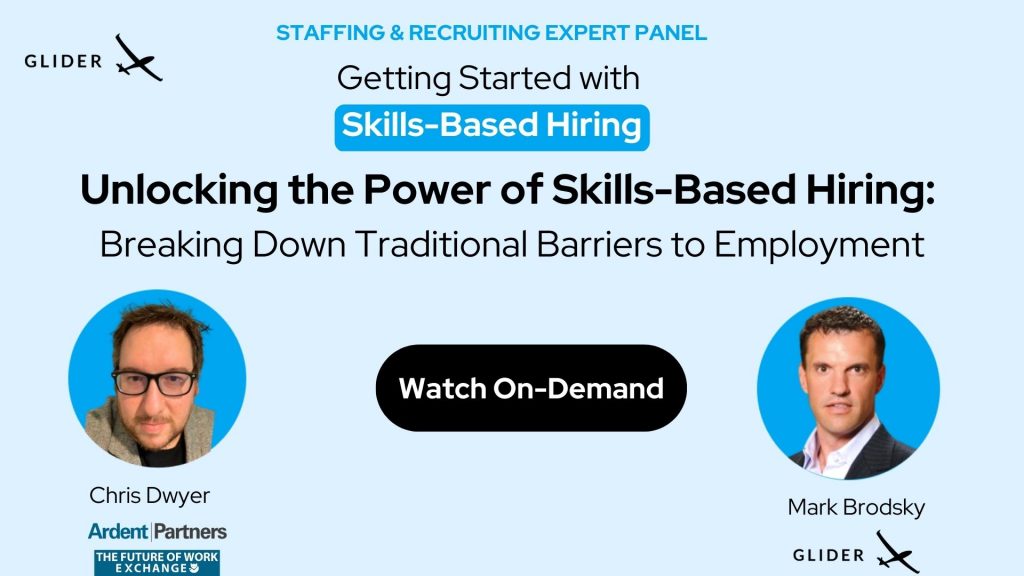
Make talent quality your leading analytic with skills-based hiring solution.

Skills-based hiring is a recruitment strategy that emphasizes the skills and abilities of job candidates over traditional qualifications such as education and work experience. This approach has gained traction in recent years as employers seek to address skill shortages, improve diversity and inclusion, and create more effective hiring processes.

In this video, we hear from TA experts Chris Dwyer, SVP at Ardent Partners, and Mark Brodsky, VP at Glider AI, who discuss the benefits and challenges of skills-based hiring. Here are some of the key takeaways:
Many employers rely on resumes and job applications as the primary means of assessing candidates, but these documents often don’t provide a full picture of a person’s abilities or potential. This can lead to bias, especially against candidates from non-traditional backgrounds.
By focusing on specific skills and abilities, rather than credentials or pedigree, employers can create a more inclusive and equitable hiring process. This approach allows candidates from diverse backgrounds to demonstrate their abilities and potential, without being held back by their education or work history.
Employers who adopt a skills-based approach are more likely to hire people who are a good fit for the job and the company culture. This can result in improved productivity, higher employee retention, and better overall business outcomes. Candidates benefit by having a more level playing field and a better chance of being hired based on their skills and potential, rather than their credentials.
Skills-based hiring requires a different set of tools and methods for assessing candidates. Employers may use skills assessments, simulations, or job auditions to evaluate candidates’ abilities. These approaches can be more effective than traditional interviews or resumes in identifying the most qualified candidates.
While skills-based hiring can help address some of the challenges of traditional recruitment methods, it is not a panacea. Employers still need to be mindful of potential biases in the hiring process and work to create a culture of inclusion and equity within their organizations.
As a recruiter, you know the frustration of sifting through piles of resumes, trying to determine if each candidate is truly qualified for the job. But what if there was a better way to assess candidates’ skills and abilities, rather than just their work history and credentials?
That’s the idea behind skills-based hiring, a revolutionary approach that is changing the way companies build their teams. Instead of focusing on a candidate’s resume, skills-based hiring assesses a candidate’s ability to do the job through various skills assessments, tests, and evaluations.
The benefits of skills-based hiring are numerous. For starters, it helps to level the playing field for job seekers who may not have the traditional credentials or work experience that employers typically look for. Instead, candidates are evaluated based on their skills and ability to perform the job duties, which means that anyone with the right skills can be considered for the role.
Skills-based hiring also helps to reduce bias in the hiring process. By focusing on a candidate’s skills and abilities, rather than their demographic characteristics, employers can ensure that they are hiring the best person for the job, regardless of their background.
Another benefit of skills-based hiring is that it can help companies build more diverse teams. By evaluating candidates based on their skills and abilities, rather than their work history or credentials, employers can open up their candidate pool to a wider range of people, which can lead to a more diverse and inclusive workplace.
So, how does skills-based hiring work in practice?
Rather than relying solely on a candidate’s resume, employers use various skills assessments, tests, and evaluations to determine if a candidate has the right skills for the job. For example, a candidate for a web development role may be asked to complete a coding challenge, while a candidate for a customer service role may be asked to participate in a mock customer service call.
Overall, skills-based hiring is a promising approach to recruitment that can help employers find the best candidates for the job, while also promoting diversity and inclusion. By focusing on skills and abilities, rather than credentials or pedigree, employers can create a more effective and equitable hiring process.

Why HR Must Lead AI Transformation — And Redefine HR Transformation in the Process Artificial intelligence is no longer a futuristic concept. It’s here, and it’s redefining how businesses operate, how decisions are made, and most importantly—how work gets done. Yet despite the sweeping impact AI is having on talent, skills, and workforce structure, HR […]

Deepfake Tech and Candidate Fraud The Growing Threat of Deepfake Job Interviews Imagine conducting a video interview with a seemingly perfect candidate—only to discover later that the person never existed. With the growing sophistication of AI-driven deepfake technology, fraudulent job candidates are manipulating job interviews to secure employment under false identities. This trend is particularly […]

Closing the Skills Gap: A Roadmap to Workforce Transformation 74% of companies struggle with skills shortages, impacting productivity, retention, and growth. Businesses face misaligned hiring, stalled career development, and inefficiencies without a clear understanding of workforce capabilities. A Skill Gap Analysis identifies deficiencies, ensuring employees are equipped for current and future roles. Glider AI’s Skill […]